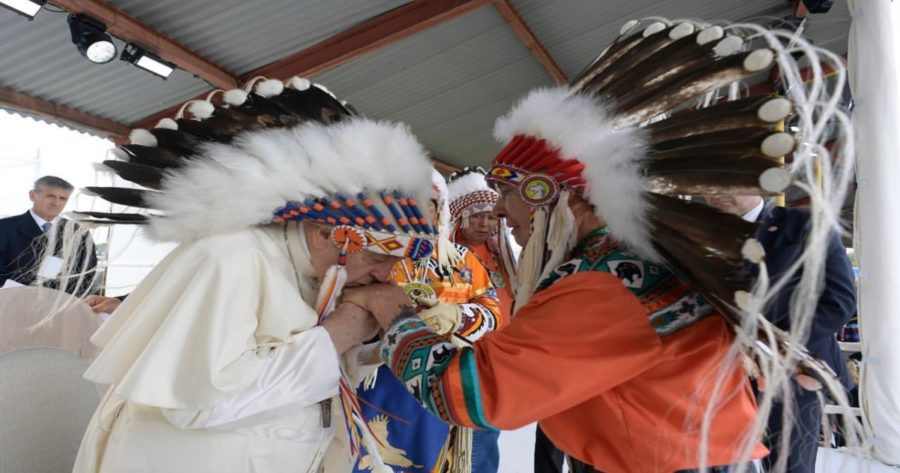Pope Francis Visits Canada For Pilgrimage Focused On Indigenous Reconciliation
- Maryam Ahmed
- Trending
- July 26, 2022

The Pope’s apology to indigenous people about the role of the church in residential schools garnered mixed responses from the community
On the first day of his “penitential pilgrimage,” Pope Francis led with a heartfelt apology delivered at the site of one of Canada’s largest residential schools and ended eight hours later with blessings and songs at an intimate service in the only designated Indigenous Church in Canada.
In a morning event in a First Nation community in central Alberta, Pope Francis apologized on behalf of members of the Catholic Church who co-operated with Canada’s “devastating” policy of Indigenous residential schools.
He made it known that the forced assimilation of Indigenous peoples into Christian society destroyed their cultures, severed their families, and marginalized generations in ways still being felt today.
“I humbly beg forgiveness for the evil committed by so many Christians against the Indigenous peoples,” Francis told thousands of Indigenous people, including many survivors, who converged on Maskwacis, Alta., about 100 kilometres south of Edmonton.
While the Pope apologized for the actions of individual Catholics and asked for forgiveness, he did not explicitly apologize for the Church’s role as an institution.
The Pope spoke in Spanish, his first language, which was translated into English by a priest. Translations were also available in several Indigenous languages.
He said begging forgiveness is the first step, and a serious investigation must be conducted. He also called the overall effects of the policies linked to residential schools “catastrophic.”
Following his apology, Francis returned a pair of moccasins to Marie-Anne Day Walker-Pelletier, a retired Chief of Okanese First Nation in Saskatchewan. She had given the children’s moccasins to the Pope when an Indigenous delegation visited Rome earlier this year.

They were meant to represent children who never came home from residential schools, and she had told the pontiff she expected him to return them when he came to apologize on Canadian soil.
The Pope’s residential school apology prompted mixed emotions from many indigenous people, including residential school survivors.
Chief Wilton Littlechild, a former Truth and Reconciliation Commission member who attended residential schools for 14 years as a child in Alberta, gave Francis a headdress at the event.
He said he hopes the Pope’s visit furthers a pathway of justice, healing, reconciliation, and hope. Jon Crier, a residential school survivor, questioned whether the Pope’s apology was enough. He said the Church must take action and lay out a plan to repair its relationship with Indigenous people.
But Fontaine, a survivor of the Fort Alexander Indian Residential School in Manitoba who led the negotiations that resulted in the 2006 Indian Residential Schools Settlement Agreement, said accepting the apology on behalf of the man who speaks on behalf of the Catholic Church is an essential step in moving forward.
“If we’re true to our word in terms of healing and reconciliation, we’re going to have to be able to forgive. He’s come here before us a humble person begging for forgiveness, and of course, you have to take that seriously, said Fontaine.
“Because we also want to move on. We want to find peace and solace in our lives. And if we can’t bring ourselves to forgive, then this matter, this burden that we’ve had to shoulder for years and years, that’ll carry on endlessly.”
Not all survivors were as satisfied with the Pope’s apology. Vivian Ketchum, a survivor of the Cecilia Jeffery Indian Residential School in Kenora who now lives in Winnipeg, said it seemed to her like the pontiff’s words “glossed over” the full truth of the effect the institutions have to this day.
“I think the sincerity might have been there, but I don’t think he fully comprehends the whole situation and what was done to us: second generation, third generation. The loss of language, culture,” said Ketchum, who was physically and sexually abused as a child at a residential school in the 1970s.
Minister of Crown-Indigenous Relations Marc Miller said the apology must be “the beginning and not the end.” He said more work must be done, including getting documents from the Catholic Church.
Organizers said sacred fires were also burning in communities throughout the country in solidarity.
Image Credit: Social Media (Instagram) of Pope Francis








